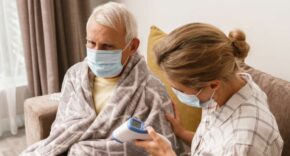
The use of smartphone technology has already played a key role in slowing down COVID-19’s progress, with governments and researchers worldwide using devices to track the location and health of their citizens, coordinate them effectively, or to send timely health updates. With the immense impact of the COVID-19 pandemic now in full effect, many initiatives have been launched globally to examine the potential of smartphone-based solutions to turn the tide on the pandemic. With a huge chunk of the worldwide population now owning a smartphone that has the capacity to collect data on the users’ health, you can see why healthcare practitioners are looking to smartphones and smart devices for solutions.
One such initiative is Sprint COVID-19, a technology task force led by the Innovation Department at Assuta Hospital in Ashdod, Israel, together with Rafael Advanced Technology, Weizmann Institute of Science and several other organisations and companies. This initiative aims to resolve key challenges associated with COVID-19, with a focus on finding effective early identification tests to prevent mass infection.
Luminati Networks, a market leader in the data collection domain, has joined to help the team develop a heuristic test that can be carried out on smartphones and smartwatches to identify asymptomatic, pre-symptomatic, and mild cases which would otherwise go undetected.
Using commonly owned smartphones sensors to track blood oxygen
Recent studies conducted in Italy and China have found that 30%-50% of the COVID-19 infected population may suffer from silent hypoxia. This means having a low level of oxygen in blood, without any obvious shortness of breath or other visible symptoms.
As these segments of the population did not feel any symptoms, there is therefore a higher chance of them infecting other people without even knowing it. In a bid to tackle this issue head-on, Sprint COVID-19 found that many commonly owned smartphones or smartwatch devices enable testing your own blood oxygen levels easily. The Sprint COVID-19 effort involves using sensors that are available on some smartphones to measure the users’ blood oxygen levels, which could be a key first step in identifying the virus early on
Using ethical data collection to identify the right type of devices
Identifying compatible smart devices was a huge task, with thousands of smartphones, smartbands and smartwatches available on the marketplace all equipped with different sensors, a prime reason for using Luminati’s data collection automation service.
Luminati Networks was able to leverage its pre-existing global IP proxy network infrastructure of 72 million IP addresses, generally used by retailers and ecommerce companies to gain an edge on their competition. Using the company’s pioneering data collection automation technology, the team was able to automatically and rapidly sift through the massive amounts of openly available data from across the internet. In just a few hours, Luminati Networks located over 110 smartphone models and 165 models of smartwatches and smart bands that can conduct this simple test.
The results
Luminati found that 17% of the global smartphone owning population owns devices that carry the Sp02 sensor which can enable the blood oxygen test. This covers nearly 19% of the US smartphone owners, including 18% of the UK smartphone owners, and up to 12% of Italian users – hugely promising numbers.
How ethical data collection can work together with healthcare research
It’s likely that researchers will identify yet more health markers that can indicate the onset of COVID-19. With the unparalleled smart devices’ multiple features, it’s probable that they will play a key role in researching and testing for these markers.
However, data, as always, plays a critical role in reaching the possible new solutions. Researchers need to use all the tools available to them to fully identify compatible devices. By not identifying the full scope of compatible devices with proper data collection mechanisms, researchers risk missing potential avenues to fight the disease.
It’s clear that above all else the medical community needs data to fully unlock the potential smart devices bring to the table in the battle against COVID-19. Like any other battle, equipped with the right kind of intelligence will always provide you a winning edge!











